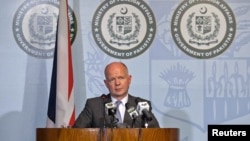LONDON - Britain has warned that Syria risks becoming "the next Bosnia."
British Foreign Secretary William Hague said the Syrian government's use of heavy weapons against the population, and the lack of intervention by the outside world, risks a civil war and loss of life on the scale seen in the breakup of Yugoslavia.
In Sarajevo, in the early 1990s, Bosnian Serb armed forces used artillery and heavy weapons against unarmed civilians.
Twenty years later, in Homs, Syria, amateur video appeared earlier this month to show mortar shells being fired into civilian housing. The footage cannot be verified.
There are dangerous parallels between the two conflicts, Hague said, warning that Syria is rapidly following the same path towards civil war.
“As we see the regime using heavy weapons against civilian-populated areas and then sending in militias to kill and murder people - this is reminiscent of Bosnia in the early '90s," Hague said. "So I don't think we should be thinking of it in terms of the Libya situation last year."
In the three years it took the international community to intervene in the Balkans, an estimated 100,000 people were killed, the worst loss of life in Europe since World War Two.
A NATO-led campaign against the Bosnian Serb forces eventually brought the war to an end in 1995.
William Hague accused Russia of blocking diplomatic efforts to end the Syrian conflict. But he gave no indication that the West is considering military intervention - though he doesn't rule it out.
“Any violent solution would clearly involve many more deaths and a great deal more hardship for the Syrian people," he said. "So we want the Annan plan to be implemented.”
British politician Paddy Ashdown was appointed U.N. High Representative for Bosnia and Herzegovina from 2002 to 2006.
He said he understands the comparison with Syria - but only to a point. “There are many differences, the chief is that in Bosnia we could have acted but we chose not to," he said. "Whereas in Syria, we’d like to act but we can’t.”
Ashdown said in its intervention in Libya, the West got it right by allowing Arab countries to take the diplomatic lead. With Syria, Ashdown said, there’s been too much talk of regime change.
“Unhappily we seem to have gone back to type, led I’m bound to say by Washington, we’ve tried to make this a Western call and we’ve tried to make it all about removing Russia’s only friend in the region,” he said.
The diplomatic tussle comes as the U.N. warns of an alarming escalation of violence in Syria. A U.N. report has accused Syrian troops of torturing children and using them as human shields.
British Foreign Secretary William Hague said the Syrian government's use of heavy weapons against the population, and the lack of intervention by the outside world, risks a civil war and loss of life on the scale seen in the breakup of Yugoslavia.
In Sarajevo, in the early 1990s, Bosnian Serb armed forces used artillery and heavy weapons against unarmed civilians.
Twenty years later, in Homs, Syria, amateur video appeared earlier this month to show mortar shells being fired into civilian housing. The footage cannot be verified.
There are dangerous parallels between the two conflicts, Hague said, warning that Syria is rapidly following the same path towards civil war.
“As we see the regime using heavy weapons against civilian-populated areas and then sending in militias to kill and murder people - this is reminiscent of Bosnia in the early '90s," Hague said. "So I don't think we should be thinking of it in terms of the Libya situation last year."
In the three years it took the international community to intervene in the Balkans, an estimated 100,000 people were killed, the worst loss of life in Europe since World War Two.
A NATO-led campaign against the Bosnian Serb forces eventually brought the war to an end in 1995.
William Hague accused Russia of blocking diplomatic efforts to end the Syrian conflict. But he gave no indication that the West is considering military intervention - though he doesn't rule it out.
“Any violent solution would clearly involve many more deaths and a great deal more hardship for the Syrian people," he said. "So we want the Annan plan to be implemented.”
British politician Paddy Ashdown was appointed U.N. High Representative for Bosnia and Herzegovina from 2002 to 2006.
He said he understands the comparison with Syria - but only to a point. “There are many differences, the chief is that in Bosnia we could have acted but we chose not to," he said. "Whereas in Syria, we’d like to act but we can’t.”
Ashdown said in its intervention in Libya, the West got it right by allowing Arab countries to take the diplomatic lead. With Syria, Ashdown said, there’s been too much talk of regime change.
“Unhappily we seem to have gone back to type, led I’m bound to say by Washington, we’ve tried to make this a Western call and we’ve tried to make it all about removing Russia’s only friend in the region,” he said.
The diplomatic tussle comes as the U.N. warns of an alarming escalation of violence in Syria. A U.N. report has accused Syrian troops of torturing children and using them as human shields.










